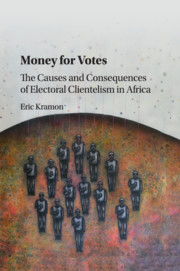Book contents
- Frontmatter
- Contents
- List of Tables
- List of Figures
- Acknowledgments
- Part I The Puzzle of Electoral Clientelism
- Part II Empirical Evidence
- 4 The Mechanics of Electoral Clientelism: Descriptive Evidence
- 5 Why is Electoral Clientelism Effective?: Experimental Evidence
- 6 Who Invests in Electoral Clientelism?: Incumbents versus Challengers
- 7 Electoral Clientelism and Ethnic Politics
- 8 Electoral Clientelism and the Provision of Local Public Goods
- 9 Conclusion
- Appendices
- Bibliography
- Index
6 - Who Invests in Electoral Clientelism?: Incumbents versus Challengers
from Part II - Empirical Evidence
Published online by Cambridge University Press: 26 October 2017
- Frontmatter
- Contents
- List of Tables
- List of Figures
- Acknowledgments
- Part I The Puzzle of Electoral Clientelism
- Part II Empirical Evidence
- 4 The Mechanics of Electoral Clientelism: Descriptive Evidence
- 5 Why is Electoral Clientelism Effective?: Experimental Evidence
- 6 Who Invests in Electoral Clientelism?: Incumbents versus Challengers
- 7 Electoral Clientelism and Ethnic Politics
- 8 Electoral Clientelism and the Provision of Local Public Goods
- 9 Conclusion
- Appendices
- Bibliography
- Index
Summary
Personally, if the politician is a first timer I would not believe [his campaign promises] at all. But given the situation that the politician is someone who is coming for a second or third time, their background will greatly determine my outcome.
Interview respondent in Kangemi, Nairobi, January 2015A central claim of this book is that electoral handouts convey information to voters. The previous chapters test different assumptions and implications of this argument, addressing questions about how electoral clientelism manifests in practice, how voters interpret the distribution of handouts, and which types of voters are most likely to be responsive to them. This chapter turns to two additional and important questions in the study of electoral clientelism. First, which types of political candidates are most likely to distribute electoral handouts? And, second, which types of candidates reap the greatest electoral benefits from electoral clientelism?
This chapter shows that the informational theory can help to answer these critical questions. Specifically, the theory implies that political candidates that are relatively unknown to voters or who lack other tools and time to establish a personal reputation for the delivery of resources are those who will invest most heavily in electoral handouts. They are also the types of candidates that will benefit most electorally from their use. This is because, as the epigraph to this chapter highlights, voters are likely to have the least developed beliefs about these types of candidates, which means that the information conveyed by electoral handouts will be most important in shaping voters’ views about them. In contrast, political candidates with well-established reputations due to their visibility or their time in office, should be less likely to rely on electoral handouts in the cultivation of electoral support. The electoral handout signal will be weak relative to all of the other information voters have about these types of established candidates.
I test these expectations by combining survey data about electoral handouts during Kenya's 2007 elections (detailed below) with official constituency level election results and original data collected about incumbents and challengers competing in the parliamentary elections. I show how these data allow me to overcome challenges that have hindered past attempts to use survey data to identify the influence of electoral handouts on voter behavior.
- Type
- Chapter
- Information
- Money for VotesThe Causes and Consequences of Electoral Clientelism in Africa, pp. 120 - 139Publisher: Cambridge University PressPrint publication year: 2017



